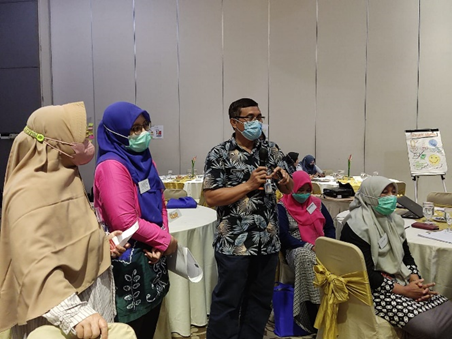Penguatan Kapasitas Tenaga Kesehatan dalam Peningkatan Imunisasi Lengkap melalui Strategi Human Centered Design (HCD)
Keywords:
Human Centered Design (HCD), Training of Trainer (ToT)Abstract
Although the number of immunization is covered, it is necessary to optimize them so that all children get immunized. Human-Centered Design (HCD) can be a solution to optimize immunization coverage. The aim of the Training of Trainers (ToT) activities is to increase the capacity of health workers is to increase their understanding and ability regarding Human Centered Design (HCD) as a method of solving the problem of not achieving immunization coverage in Central Java. The training four consecutive days, with interactive learning designs including lecture methods, facilitation, discussions, quick investigation practices, and presentations held in Banyumas Regency. The number of trainees consists of 30 participants from 5 districts (Brebes, Banjarnegara, Cilacap, Banyumas, Pemalang, and Tegal). The media used in this training are power points, modules, textbooks, pocketbooks, videos, and other tools for quick investigation. Evaluation does by giving pretest and posttest every day. Based on the results of the pretest and posttest, there was an increase in participants' knowledge about HCD material. Participants can carry out quick investigation practices, make prototypes and present them according to the HCD Steps. This service concludes that there is an increase in knowledge and ability to carry out HCD so that participants are ready to become HCD training trainers. It is necessary to carry out HCD training for health workers, cadres, and other community elements to solve the problem of immunization in the community.
References
Agustina, M., Azizah, E. N., & Koesmadi, D. P. (2021). Pengaruh Pemberian Reward Animasi terhadap Motivasi Belajar Anak Usia Dini selama Pembelajaran Daring. Jurnal Obsesi : Jurnal Pendidikan Anak Usia Dini, 6(1), 353–361. https://doi.org/10.31004/obsesi.v6i1.1331
Dakhi, Y. (2016). Implementasi POAC terhadap Kegiatan Organisasi dalam Mencapai Tujuan Tertentu. Jurnal Warta, 53(9), 1679–1699. Retrieved from https://media.neliti.com/media/publications/290701-implementasi-poac-terhadap-kegiatan-orga-bdca8ea0.pdf
Dirjen P2P. (2022). Laporan Harian Capaian Bulan Imunisasi Anak Nasional Tahap I dan II. Jakarta.
Eva, Y. (2020). Efektivitas Pemberian Reward Terhadap Motivasi Belajar. Prosiding Seminar Nasional Matematika Dan Sains, (20), 128–137. Indramayu. Retrieved from https://prosiding.biounwir.ac.id/article/view/129
Gede, I., Heriawan, T., Dewi, I. A., Mpu, S., & Singaraja, K. (2021). Efektivitas Pembelajaran Daring Dalam Meningkatkan Keaktifan Siswa Melalui Media Pembelajaran Quizizz Di Kaum Pelajar Masa Kini. Jurnal Pusat Penjaminan Mutu, 2(2), 2746–7074. Retrieved from https://jurnal.stahnmpukuturan.ac.id/index.php/jurnalmutu/article/view/1685
Heryana, A. (2019). Metodologi Penelitian Kesehatan Masyarakat. In Deepublish.
Kemenkes RI. Peraturan Menteri Kesehatan Republik Indonesia Nomor 12 Tahun 2017 Tentang Penyelenggaraan Imunisasi. , (2017). Indonesia. https://peraturan.bpk.go.id/Home/Details/111977/permenkes-no-12-tahun-2017
Kemenkes RI, Tulodo, & Unicef. (2022). Materi HCD Human-Centered Design ToT Pelatihan HCD (Human Centered Design - Pendekatan Berbasis Manusia) dalam Rangka Peningkatan Kapasitas Tenaga Kesehatan di Indonesia. Jakarta: Tulodo.
KemenkesRI. Undang - Undang Republik Indonesia Nomor 36 Tahun 2009 Tentang Kesehatan. , (2009). Retreived from https://peraturan.bpk.go.id/Home/Details/38778/uu-no-36-tahun-2009
KemenkesRI. (2014). Buku Ajar Imunisasi. In Kementerian Kesehatan RI (I). Jakarta: Pusdiklatnakes Kemenkes RI. Retrieved from http://r2kn.litbang.kemkes.go.id:8080/handle/123456789/58388?show=full
Notoatmodjo, S. (2005). Promosi Kesehatan : Teori dan Aplikasi (1st ed.). Jakarta: PT Asdi Mahasatya.
Prabamurti, P. N., Musthofa, S. B., Husodo, B. T., Handayani, N., Riyanti, E., Istiarti, V. T., & Widagdo, L. (2022). Pengembangan dan Pengorganisasian Masyarakat (XVII). Semarang: Promosi Kesehatan dan Ilmu Perilaku FKM Undip.
Promkes Kemenkes RI. (2022). Diseminasi Pendekatan Human Centered Design (HCD). Retrieved from Direktorat Promosi Kesehatan dan pemberdayaan Masyarakat Kementerian Kesehatan Republik Indonesia website: https://promkes.kemkes.go.id/diseminasi-pendekatan-human-centered-design-hcd
Ramadhani, D. A., & Muhroji. (2022). Peran Guru dalam Meningkatkan Motivasi Belajar pada Peserta Didik di Sekolah Dasar. Jurnal Basicedu, 6(3), 4855–4861. https://doi.org/10.31004/basicedu.v6i3.2960
Setiaman, S. (2020). Merancang Kuesioner Untuk Penelitian.
Singh, A., Kumar, K., & Ganesh, J. (2022). Leverage Design Thinking to Build Enterprise.
Skinner, B. F. (1967). A history of psychology in autobiography. Appleton-Century-Crofts, 5, 385–143. https://doi.org/10.1037/11579-014
Syafrawati. (2006). Analisis Perencanaan Tahunan Kesehatan Sub Dinas Pencegahan Dan Pemberantasan Penyakit Dinas Kesehatan Kota Depok Tahun 2002. Jurnal Kesehatan Masyarakat, 1(1), 9–13. https://doi.org/10.24893/jkma.v1i1.4
Viani, K. O. (2017). Pentingnya Perencanaan dalam Program Imunisasi di Dinas Kesehatan Kota Surabaya. Jurnal Kesehatan Masyarakt, 5(2), 105–110. Retrieved from https://e-journal.unair.ac.id/JAKI/article/download/3500/pdf/22268
Walker, C., Nolen, T., Du, J., & Davis, H. (2019). Design Thinking: Harvard Bussiness School. https://doi.org/10.1145/3347709.3347775
Zakiyyah, D., Suswandari, M., & Khayati, N. (2022). Penerapan Ice Breaking Pada Proses Belajar Guna Meningkatkan Motivasi Belajar Siswa Kelas Iv Sd Negeri Sugihan 03. Journal of Educational Learning and Innovation (ELIa), 2(1), 73–85. https://doi.org/10.46229/elia.v2i1.333

Published
How to Cite
Issue
Section
Copyright (c) 2023 Novia Handayani, Aditya Kusumawati, Ayun Sriatmi, Martini, Sutopo Patria Jati, Nissa Atul Asfiya

This work is licensed under a Creative Commons Attribution-ShareAlike 4.0 International License.
Authors who publish with Poltekita: Jurnal Pengabdian Masyarakat agree to the following terms:
- Authors retain copyright and grant the journal right of first publication with the work simultaneously licensed under a Creative Commons Attribution License (CC BY-SA 4.0) that allows others to share the work with an acknowledgment of the work's authorship and initial publication in this journal.
- Authors are able to enter into separate, additional contractual arrangements for the non-exclusive distribution of the journal's published version of the work (e.g., post it to an institutional repository or publish it in a book), with an acknowledgment of its initial publication in this journal.
- Authors are permitted and encouraged to post their work online (e.g., in institutional repositories or on their website) prior to and during the submission process, as it can lead to productive exchanges, as well as earlier and greater citation of published work.

This work is licensed under a Creative Commons Attribution-Share Alike 4.0 International License
You are free to:
- Share, copy and redistribute the material in any medium or format
- Adapt, remix, transform, and build upon the material for any purpose, even commercially.
- The licensor cannot revoke these freedoms as long as you follow the license terms.

1.png)


